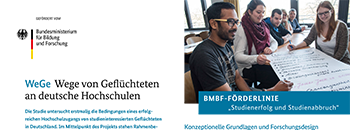Welcome!
The WeGe-study investigates the situation in study preparation classes and the key conditions for a successful integration of refugees and asylum seekers into the German higher education system.
We would like to thank everyone who has supported us so far and especially the participants in our surveys and interview studies for the trust they have placed in us and wish you health and success!
On this website you'll find information and the latest news on the study. Moreover, we will provide information about our findings, publications and upcoming events. Participants will find information on data privacy and protaction.
News
Show all NewsOnline final workshop of the DZHW project
On December 7th and 8th, 2020, the results of the project "Refugees on their way into German higher education" (short: WeGe) and other research projects were discussed online at a final workshop. The keynotes by Prof. Dr. Yasemin Karakaşoğlu (University of Bremen) and Dr. Sally Baker (University of New South Wales, Sydney) embedded the findings into the national and international discourse on flight and study. During the workshop, the participants from practice, politics and research discussed options for further knowledge transfer and the importance of the corona pandemic for the future development of refugees' study preparation in Germany.
On the basis of the survey data from the WeGe project, the success rate of refugees in study preparation courses can be estimated at about 72 percent. From different perspectives, these and other studies show how individual, social and institutional factors interact in the transition to higher education and influence the educational careers of highly qualified refugees in Germany. The workshop participants discussed intensively how an increased orientation on resources can be used for content and didactic innovations in study preparation and to realize the educational potential of refugees. Taylored information offers as well as accompanying measures that strengthen student identity and social cohesion during study preparation play an important role. An expansion of the dialogue on the significance of social and linguistic integration factors is a cornerstone in further reducing barriers for refugees interested in studying. Also, as the reseachers and the experts from practice highlight, it is crucial to make use of the effective cooperation structures on the local level to increase refugees' access chances to preparatory courses and to organize study preparation programs even better.
A panel discussion took up the current situation. Increased by the effects of the corona pandemic, political and practical follow-up questions arise. The dicussants focused on the possibilities of a sustainable design of successful study transitions for international university applicants with and without refugee background. At the end of the workshop, they discussed the light and dark sides of the digitization of offers in study preparation. The targeted support from higher education politics and universities enabled hybrid and online courses to be provided quickly. However, on the basis of their experience with the organizational adjustment processes to date, the experts once again emphasized the individual, social and institutional conditions for high quality teaching and successful learning in study preparation.
The workshop will be successively documented on the website of the WeGe project . If you are interested in certain presentations, please contact the project staff at wege@dzhw.eu.
StS
Geflüchtete in der Studienvorbereitung. Erfolgreiche Abschlüsse und Entwicklungspotenziale
Hannover, 26.11.2020. Unter den Studienbewerber*innen aus Nicht-EU-Ländern befinden sich in den letzten Jahren zunehmend hochqualifizierte Geflüchtete. Ihre Studienvorbereitung hat sich nicht zuletzt durch öffentliche Förderprogramme des Bundes, wie das Integra-Programm, aber auch durch Programme vieler Bundesländer weiter entwickelt. Der heute erschienene DZHW-Brief gibt Einblicke in die formale und praktische Ausgestaltung der Hochschulzugangswege Geflüchteter sowie ihre Situation in der Studienvorbereitung. Welche langfristigen Wirkungen Innovationen im Bereich der Studienvorbereitung haben, muss sich noch zeigen, auch weil viele Projekte von kurz- und mittelfristiger Projektförderung abhängig sind. Schon jetzt dokumentieren aber Befragungsdaten des Projektes WeGe, dass viele geflüchtete Studienbewerber*innen die Studienvorbereitung erfolgreich abschließen konnten. Die Studie des DZHW schätzt die Erfolgsquote auf rund 72 Prozent, also fast drei Viertel der befragten geflüchteten Studienbewerber*innen. Dabei ist die Studienvorbereitung durchaus von finanziellen Problemen oder einer als unsicher wahrgenommenen Aufenthaltsperspektive belastet. „Da Geflüchtete die Studienvorbereitung trotz alledem in der großen Mehrzahl erfolgreich abschließen, erweist sich eine Defizitperspektive auf diese Gruppe als unbegründet. Vielmehr könnte eine Ressourcenperspektive dazu beitragen, Potenziale noch besser zu nutzen“, erläutert der Projektleiter Michael Grüttner. Als vorteilhaft erweisen sich laut der Untersuchung des WeGe-Projekts insbesondere eine starke Bindung an das angestrebte Studienfach sowie die sprachliche und soziale Integration. Diese Faktoren helfen, wichtige Ressourcen zu mobilisieren, um dem Ziel näherzukommen, ein Studium in Deutschland aufzunehmen. Dennoch unterscheiden sich Geflüchtete in der Wahrscheinlichkeit ihres Studienvorbereitungserfolgs von anderen internationalen Studienbewerber*innen, deren geschätzte Erfolgswahrscheinlichkeit nämlich noch einmal 15 Prozentpunkte höher liegt, also bei 87 %. Deshalb gehen die Hochschulforscher*innen davon aus, dass eine bessere Flankierung der Studienvorbereitung durch andere hochschul-, sozial-, und migrationspolitischen Regelungen sowie eine frühzeitige individuelle Bildungs- und Studienberatung und zielgruppenorientierte Informationsstrategien dazu beitragen könnten, bei geflüchteten Studienbewerber*innen weitere Potenziale zu erschließen.
DZHW Brief hier.
MG




